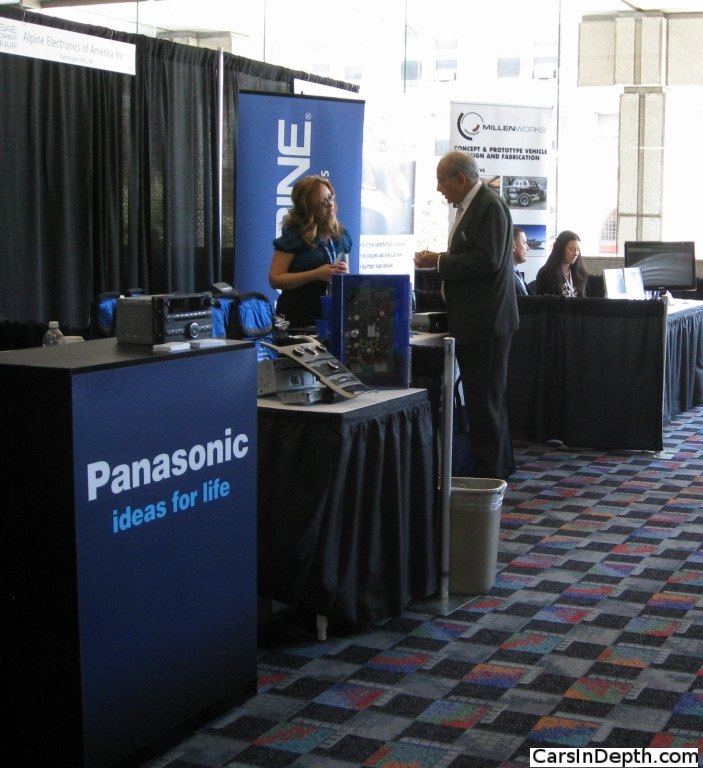SAE World Congress: Not Enough Automotive Engineers to Go Around

The Society of Automotive Engineers World Congress held in Detroit every April serves a number of functions for the automotive engineers’ professional association.
There are speeches (lately, it seems, more by Washington bureaucrats than by real, you know, engineers), technical panels, papers presented, standards suggested, and the big floor of Cobo Hall is pretty much turned into a trade show with booths from car companies, vendors, startups, and regional & international economic development delegations. If you want swag you can sell on eBay, go to a big auto show media preview (though things have changed and thumb drives aren’t quite as collectible today as diecast models once were). However, if you want free pens and the kind of swag that appeals to nerds like the cool little screwdriver set that Magna Powertrain gave out, go to the SAE convention. Also, if you’re an engineer looking for a job, or,a company looking to hire automotive engineers, you need to attend.
Last year, the concourse at Cobo was two-thirds filled with recruiting booths with companies looking to increase technical staffing that had been cut deep into the bone during the meltdown of the domestic auto industry in 2007-2009. The 2011 SAE World Congress saw a hiring frenzy. This year, the concourse was completely filled with recruiting booths. SAE international president Frank Klegon told me that there were significantly more companies at the recruiting fair this year than last. There wasn’t so much of a hiring frenzy this year, though. A recruiting frenzy, yes, but just about every company that I spoke to said that they were struggling to meet their quotas. In addition to the recruiting fair, there were also kiosks with job postings and the engineers in attendance seemed far more interested in the booths on the show floor than in the job postings. Most of the companies in the recruiting fair were also represented on the show floor, trying to sell something, but some came to the World Congress just to hire engineers
It’s sometimes difficult getting people to recognize just how international the automotive community in southeastern Michigan has become. Yes there were delegations from Korean, Canadian, Mexican, Italian and other foreign companies and trade groups in the vendor displays inside Cobo Hall, but a walk through the SAE job fair in the building’s lobby shows just how many international companies have located engineering and production facilities in America’s industrial heartland. Almost all of the companies recruiting have offices or operations in Michigan or nearby states and they were hiring for those facilities. In the vendor displays, Tata Technologies showed off their eMO EV concept, designed and built in the Indian company’s facility not far from Detroit.
Not all the recruiting was for American operations. In the lobby, Tata’s parent company was again trying to recruit engineers for their corporate R&D center in Maharashtra state, India. Next door to the Tata recruiter was a table for Saudi Aramco. With companies telling me that they were having trouble finding enough automotive engineers to staff their operations in Auburn Hills or Plymouth, Michigan, I don’t envy the folks trying to place engineers in Pune and Jeddah.
The story was the same at small firms looking to hire a relative handful of engineers and those looking to fill 200 or more positions. They were getting interest from qualified applicants, but not enough to meet their needs. One problem facing recruiters is that during the carpocalypse of 2007-2009, many engineers permanently left the automotive industry, tired of its constant boom and bust cycles. Some will never return to working in automotive, but for others, like the Jatco rep demonstrating one of the CVTs they supply to their parent, Nissan, there was a reason why they worked in the automotive sector in the first place. I’m not sure if the metaphor fits in an era of Lithium-Ion batteries, but some people are just born with gasoline in their veins. Unfortunately for recruiters in the industry, right now there aren’t enough of them to go around.
Ronnie Schreiber edits Cars In Depth, a realistic perspective on cars & car culture and the original 3D car site. If you found this post worthwhile, you can dig deeper at Cars In Depth. If the 3D thing freaks you out, don’t worry, all the photo and video players in use at the site have mono options. Thanks – RJS

Ronnie Schreiber edits Cars In Depth, the original 3D car site.
More by Ronnie Schreiber
Latest Car Reviews
Read moreLatest Product Reviews
Read moreRecent Comments
- Lorenzo Motor sports is dead. It was killed by greed.
- Ravenuer Sorry, I just don't like the new Corvettes. But then I'm an old guy, so get off my lawn!😆
- Lorenzo Will self-driving cars EVER be ready for public acceptance? Not likely. Will they ever by accepted by states and insurance companies? No. There must be a driver who is legally and financially liable for whatever happens on a public thoroughfare. Auto consumers are not afraid of the technology, they're afraid of the financial and legal consequences of using the technology.
- Lou_BC Blows me away that the cars pictured are just 2 door vehicles. How much space do you need to fully open them?
- Daniel J Isn't this sort of a bait and switch? I mean, many of these auto plants went to the south due to the lack of unions. I'd also be curious as how, at least in my own state, unions would work since the state is a right to work state, meaning employees can still work without being apart of the union.






































Comments
Join the conversation
I'm from Long Island, where anyone with an engineering inclination was expected to graduate and spend the rest of their career at Grumman, Sperry, Fairchild-Republic, or one of the smaller companies supporting them. Then the Berlin Wall fell and there weren't any fallback industries for anybody. Grumman tried diversification in the 1970's, but retreated back into their government-contract-to-government-contract comfort zone. That worked brilliantly. So the net result was late-1980's and early-1990's grads working in auto parts stores. And those who got related jobs were paid on the cheap. What kind of advice do you think their kids are getting? I'm a shade-tree mechanic from childhood, have a physics degree, worked eight years as a test engineer for a filter company and now work in new media. I'd love to get my hands dirty helping design cars, but no one would give me a second look because first, I'm too old and second, I've never worked in the business, at least officially. Wonder how many people like me (like most of the people here, even) have been overlooked over the years.
Being that I am currently working on my Mechanical Engineering degree, with plans to go into the automotive field, this is music to my ears. Let's hope automotive engineers remain at a relative premium when I graduate a few years from now : P